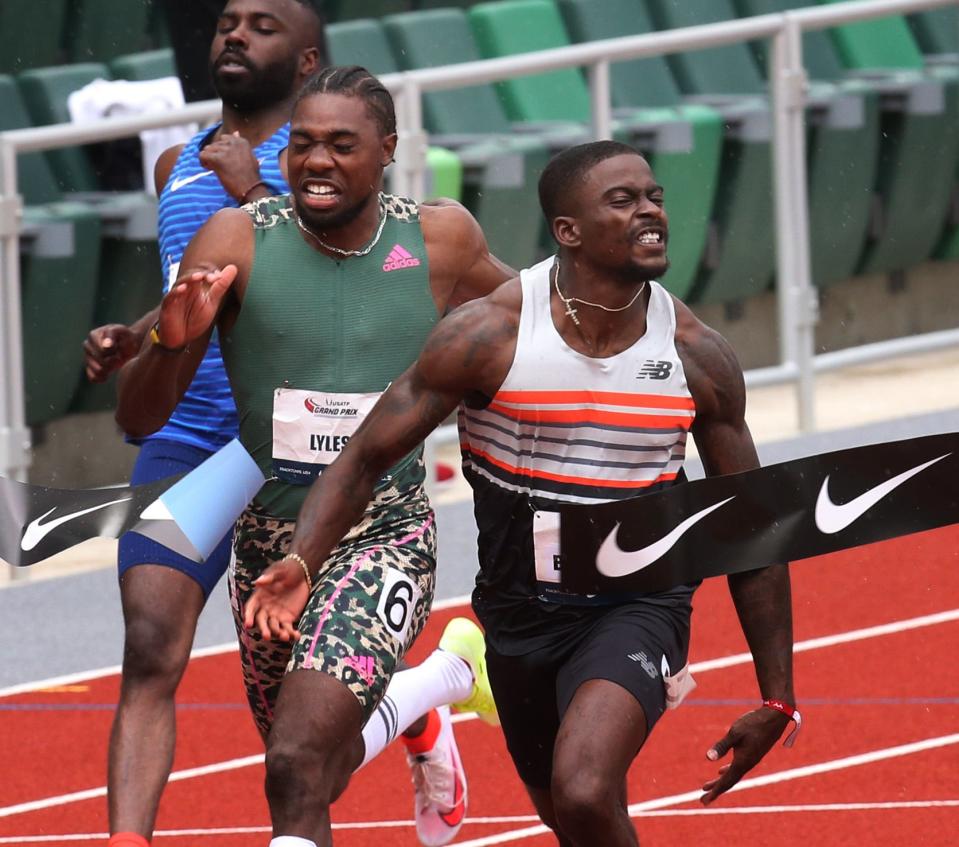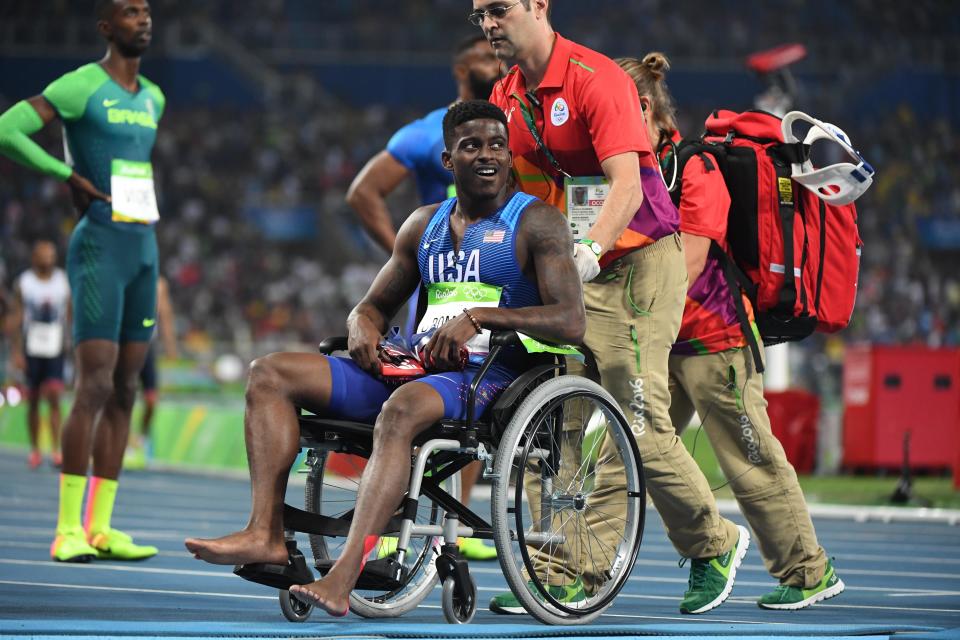'Faith is measured in patience': The remarkable resurgence of US sprinter Trayvon Bromell
Trayvon Bromell arrived at the 2016 Rio Games with a nagging twinge in his left heel, hoping to numb the pain for a few weeks so he could chase an Olympic medal.
He left the track on Aug. 19, 2016 in a wheelchair.
In the years that followed, Bromell – once considered one of the United States' brightest young sprinting talents – found himself trapped in a cycle of injury and rehab. He had two Achilles surgeries to repair a bone spur, then injured an adductor muscle. In a span of 41 months, he ran just three races, leaving him to doubt whether he would ever get back to the athlete he once was.
"I feel like anybody would," Bromell told USA TODAY Sports.
Even now, the 25-year-old still doesn't consider himself to be 100% healthy – though you wouldn't know it by his recent performances.
After three years of injuries and rehab, Bromell has run three of the six fastest 100-meter times in the world in 2021, including a personal best – and world-leading – 9.77 earlier this month. He is one of just five American men to ever run the 100 in 9.8 seconds or fewer.
And among all the marquee names in the 100-meter field at this week's U.S. Olympic track and field trials, Bromell has become arguably the man to beat. The final will be held Sunday, with the top three finishers qualifying for the Olympic team.
"I’m just going with the flow, to be honest," Bromell said. "Whatever God has for me, He has for me. Whatever happens, I’m still going to give Him the praise regardless."
Bromell is one of several athletes who have benefitted from the one-year postponement of the Tokyo Olympics, caused by the coronavirus pandemic.
Though he says he was in good shape at this time last year, the 5-foot-8 sprinter believes the extra year gave him more time to heal and adjust to the training program of his new coach; Bromell left his college coach, Mike Ford, in 2019 to train with Rana Reider.
"In terms of confidence in his body, and confidence to have another 10 months of training, I think it was a big thing for him," said Reider, who also coaches Canadian sprinter Andre De Grasse and U.S. triple-jumper Christian Taylor, among others.

Reider described Bromell as "a good, hard-working guy who’s had a pretty bumpy road." And those bumps date back long before the injury in 2016.
Bromell has said he grew up in poverty in St. Petersburg, Florida, telling NBC last year that "we didn’t really have a lot" and his mom worked long hours to provide stability for the family. He also suffered a variety of serious injuries in middle and high school, including a fractured hip, broken arm and damage to both knees – all in the span of a few years.
Yet when those injuries healed, Bromell quickly emerged as a rising star. He won a junior national championship, was named Gatorade’s national track and field athlete of the year and earned a scholarship to Baylor, where he went on to win two NCAA titles before signing a pro contract with New Balance.
Bromell seemed poised for a breakthrough season the following year, in 2016. He won his first world championship indoors in the 60-meter dash.
Then, ahead of a meet in England in early June, he felt the pain in his heel.
"It was kind of like a prick," Bromell recalled. "We had to just try to figure out a way to numb the pain to get to a state where I could go out and compete for the Olympics."
Despite the injury, Bromell managed to finish second in the 100 at the 2016 trials, then made it to the Olympic final in Rio, where he placed eighth. He also anchored Team USA's 4x100 relay, going head-to-head with Usain Bolt in what would prove to be the Jamaican's final Olympic race. (The U.S. finished third but was later disqualified due to an improper baton exchange.)

Bromell had surgery after returning home from Rio, but when he raced again in 2017, his heel still didn't feel right. A second surgery followed and he missed the entirety of 2018. Then, during a second comeback attempt in 2019, he injured an adductor muscle.
"You’ve got to have patience and faith," he said. "Those are the main, key components that helped me get through the situation – trusting that God would get me the tools, put around the right people, and having the patience to go through those trying times."
When Reider first started working with Bromell in the summer of 2019, he knew they would need to essentially rebuild the sprinter from his feet up. Reider called it "the Trayvon project."
"Basic tests, like basic hops on legs, just really basic stuff, he couldn’t do," Reider said. "So really we weren’t sure how much we could get him back, and how long it would take."
The rehabilitation process has been monotonous and nonstop. Reider and his staff asked Bromell to repeat small, simple movements – like walking barefoot in the grass, or performing a series of "baby hops" with a 45-pound weight on his back. Bromell has been doing extra rehab or prehab exercises for almost two years now, Reider said, and he's trained straight through the pandemic with few breaks.
"The trials are going to be the first time that he’s actually fresh," Reider added.
The longtime coach said he's been impressed by Bromell's work ethic as he has weathered the ups and downs of his career, from the high-school hype to the injuries to where he is now, a steady pro with a strong chance of medaling in Tokyo.
For Bromell, who is deeply religious, it's simply been a byproduct of faith.
"As far as me getting back to running, it’s just all about timing," he said. "I think faith is measured in patience. And I feel like He showed me that and He’s showing everybody that."
Contact Tom Schad at tschad@usatoday.com or on Twitter @Tom_Schad.
This article originally appeared on USA TODAY: US sprinter Trayvon Bromell at Olympic trials as man to beat in 100

